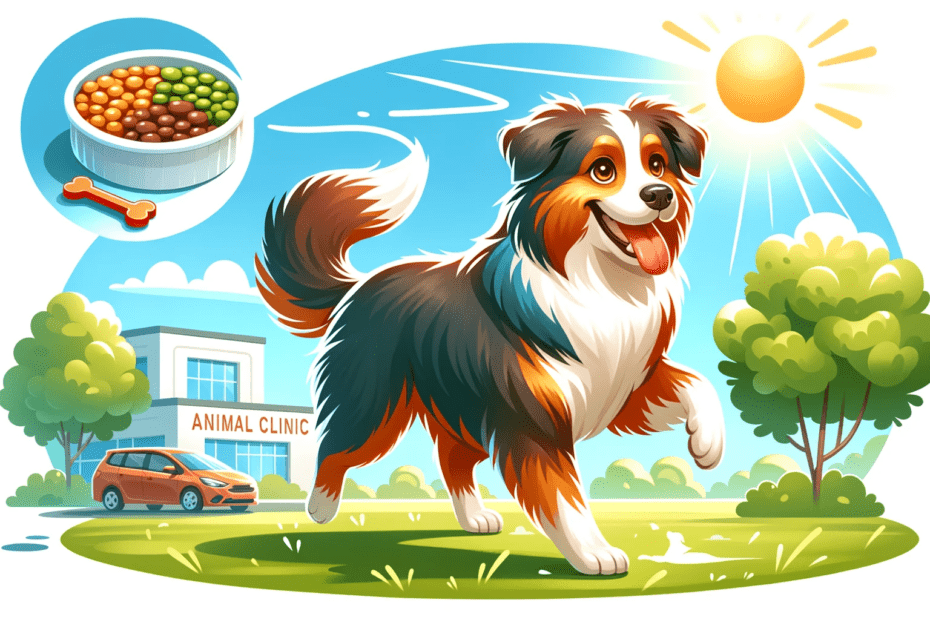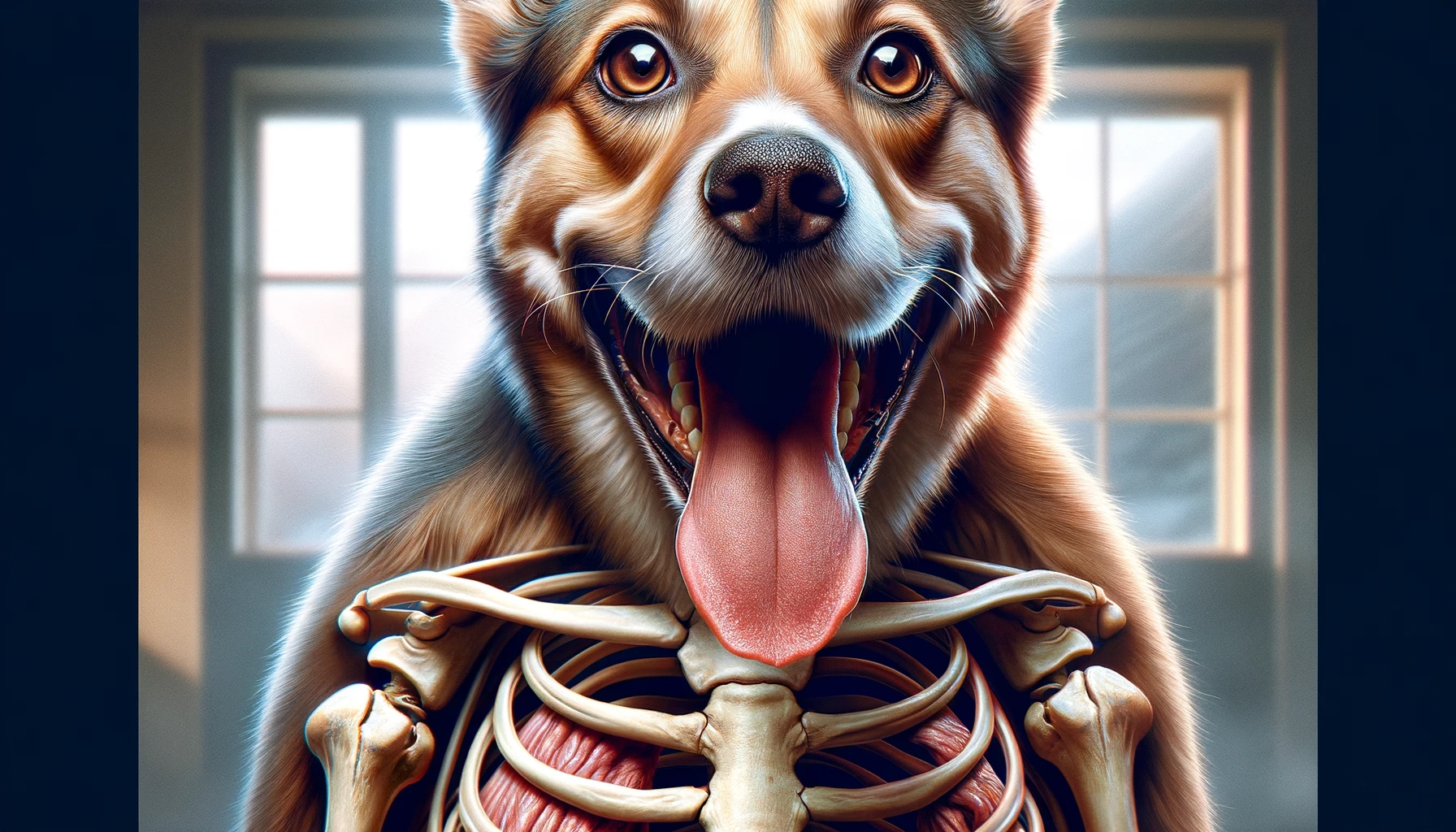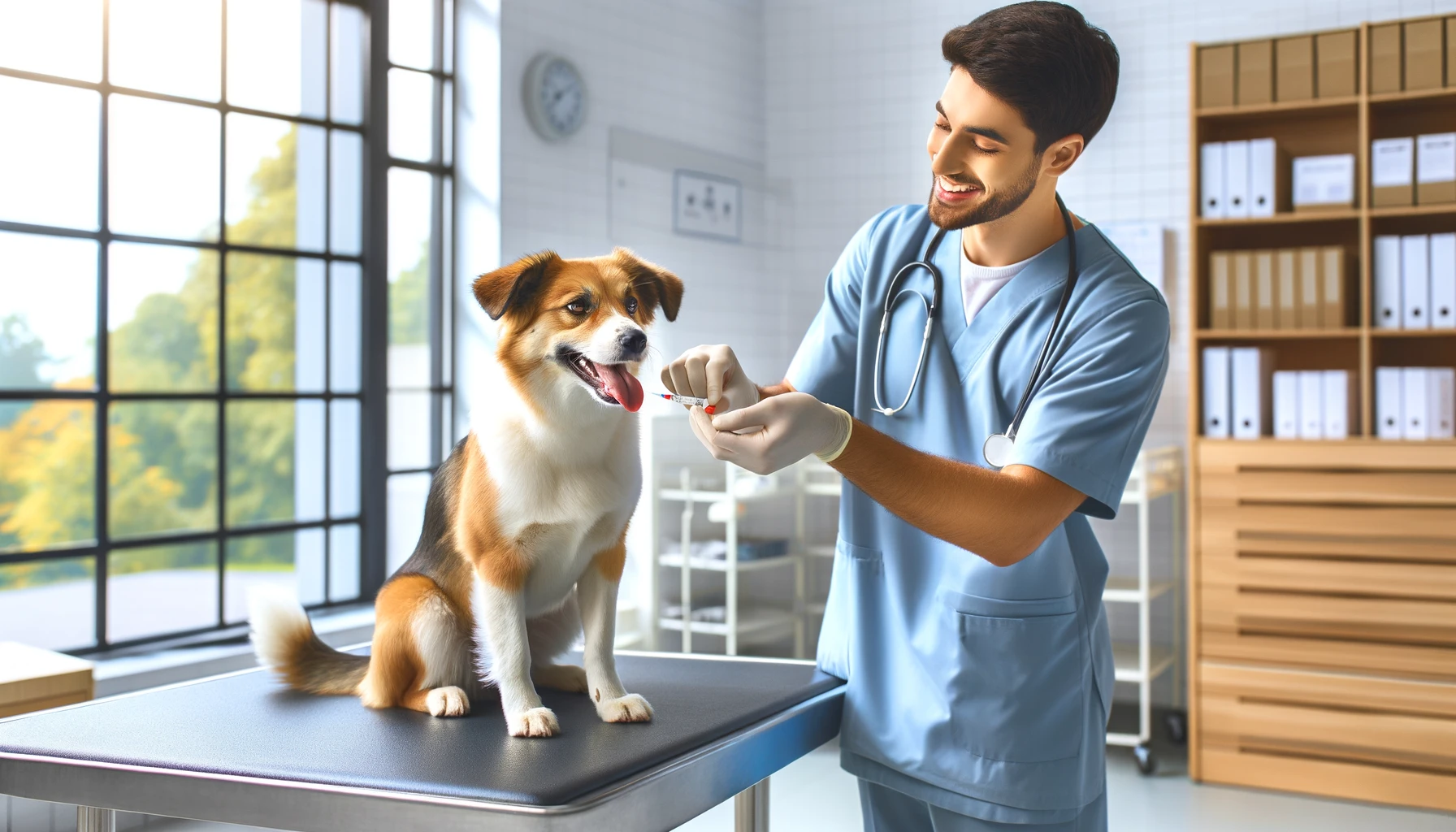Are you looking to keep your furry friend happy and healthy? Look no further! This article will provide you with essential dog health tips for optimal well-being.
From nutrition and exercise to vaccinations and dental care, we've got you covered.
Regular check-ups and parasite prevention are also key to ensuring your dog's overall health.
Follow these tips and watch your pup thrive!
Key Takeaways
- Balanced and nutritious diet is crucial for optimal health
- Daily exercise is crucial for overall well-being
- Regular vaccinations offer numerous benefits for overall well-being
- Regular brushing and dental check-ups are important for dental health and overall well-being
Nutrition
To ensure your dog's optimal health, it's crucial to provide them with a balanced and nutritious diet. A proper canine diet is essential for meeting their nutritional requirements and promoting overall well-being. Dogs, like humans, require a combination of proteins, carbohydrates, fats, vitamins, and minerals to thrive.
Protein is a vital component of a dog's diet as it supports muscle development, repair, and growth. High-quality sources of protein include lean meats, fish, and eggs. Carbohydrates provide energy and should come from sources like whole grains and vegetables. Fats, found in oils and animal fats, are necessary for healthy skin and coat, as well as the absorption of fat-soluble vitamins.
Vitamins and minerals are essential for various bodily functions, such as maintaining a strong immune system and promoting proper bone development. Incorporate a variety of fruits, vegetables, and supplements to ensure your dog receives an adequate amount of these nutrients.
It is important to note that every dog is unique, and their dietary needs may vary based on factors such as age, breed, and activity level. Consulting with a veterinarian is crucial in determining the specific nutritional requirements of your dog.
Exercise
To ensure your dog's optimal well-being, daily exercise is crucial. Not only does it help maintain a healthy weight, but it also promotes cardiovascular health and mental stimulation. Suitable activities can include brisk walks, playing fetch, or even swimming.
Remember to follow exercise duration guidelines based on your dog's age, breed, and overall health to keep them happy and healthy.
Importance of Daily Exercise
Regular exercise is essential for your dog's overall health and well-being. Here are three reasons why daily exercise is important for your furry friend:
- Physical health: Exercise helps prevent obesity, which can lead to various health issues in dogs. It promotes muscle strength, cardiovascular health, and joint flexibility. Different dog breeds have different exercise needs, so it's important to tailor the activities to your dog's specific needs.
- Mental stimulation: Daily exercise provides mental stimulation for dogs, which is crucial for their overall well-being. It helps prevent boredom and destructive behaviors. Engaging in physical activities also releases endorphins, promoting a positive mood and reducing anxiety.
- Behavioral training: Regular exercise plays a significant role in behavioral training. It helps to burn off excess energy, making it easier for dogs to focus and learn new commands. Exercise can also help alleviate behavioral problems such as excessive barking or chewing.
Types of Suitable Activities
Try incorporating a variety of activities into your dog's exercise routine to keep them engaged and physically active. Suitable exercises for dogs include walking, jogging, swimming, and playing fetch. These activities help to improve cardiovascular health and maintain a healthy weight.
Additionally, mental stimulation is essential for your dog's overall well-being. You can provide mental exercise by incorporating activities such as puzzle toys, obedience training, and interactive games. These activities engage your dog's mind, preventing boredom and promoting mental sharpness.
Remember to vary the exercises to keep your dog challenged and interested. It's important to consult with your veterinarian to determine the appropriate level of exercise for your dog based on their breed, age, and health condition.
Exercise Duration Guidelines
For optimal well-being, aim for at least 30 minutes of exercise per day with your dog. Regular exercise not only helps to keep your dog physically fit but also promotes mental stimulation and overall happiness.
To ensure that your dog receives the maximum benefits from their exercise routine, it's important to consider the exercise intensity and proper warm-up techniques. Here are some guidelines to help you make the most of your dog's exercise time:
- Gradually increase exercise intensity: Start with low-intensity activities such as walking or gentle play and gradually increase the intensity over time. This will help prevent injuries and improve your dog's endurance.
- Incorporate proper warm-up techniques: Before engaging in more vigorous activities, take a few minutes to warm up your dog's muscles. This can be done through light stretching or a short walk.
- Monitor your dog's energy levels: Pay attention to your dog's energy levels during and after exercise. If they appear overly tired or show signs of exhaustion, it may be necessary to adjust the duration or intensity of their exercise.
Vaccinations
Now let's talk about vaccinations, an essential aspect of your dog's health.
A required vaccination schedule ensures that your furry friend is protected against vaccine-preventable illnesses.
Regular vaccinations offer numerous benefits, including the prevention of serious diseases and the promotion of your dog's overall well-being.
Required Vaccination Schedule
Make sure to stay on top of your dog's required vaccination schedule to keep them healthy and protected. Vaccinations are an essential part of preventive healthcare for your furry friend.
Here are some important points to know about your dog's vaccination schedule:
- Vaccine Side Effects: Although rare, vaccines can sometimes cause mild side effects such as lethargy, soreness at the injection site, or a slight fever. These side effects are usually temporary and resolve on their own.
- Vaccination Cost: The cost of vaccinations can vary depending on your location and the specific vaccines required. It's important to budget for these expenses and discuss any concerns with your veterinarian.
- Consult with your veterinarian: Your veterinarian is the best person to guide you through your dog's vaccination schedule. They'll be able to recommend the appropriate vaccines based on your dog's age, lifestyle, and risk factors.
Vaccine-Preventable Illnesses
To ensure optimal well-being for your dog, it's crucial to regularly vaccinate them against preventable illnesses. Canine vaccines are specifically designed to protect your furry friend from a range of diseases that can be harmful or even fatal.
Vaccinations work by stimulating your dog's immune system to produce antibodies that fight off specific pathogens. This helps to prevent the development and spread of diseases such as distemper, parvovirus, rabies, and kennel cough. It's important to note that vaccines aren't 100% effective, but they significantly reduce the severity of illnesses and the chances of complications.
Additionally, vaccines also play a crucial role in preventing the spread of diseases to other dogs in the community. Regularly consulting with your veterinarian and following the recommended vaccination schedule will ensure that your dog receives the necessary protection against vaccine-preventable illnesses.
Benefits of Regular Vaccinations
By regularly vaccinating your dog, you can ensure their optimal well-being and protect them from a range of preventable illnesses. Vaccinations are a crucial aspect of preventive healthcare for dogs. Here are the benefits of regular vaccinations:
- Vaccine effectiveness:
Vaccines are designed to stimulate your dog's immune system and prepare it to fight off specific diseases. By administering vaccines at the appropriate time, you can help your dog develop a strong immune response against these diseases. This greatly reduces the risk of your dog falling ill or experiencing severe symptoms if they're exposed to the pathogens.
- Herd immunity:
Regular vaccinations not only protect your own dog but also contribute to the overall well-being of the canine population. When a significant number of dogs in a community are vaccinated, it creates a concept called 'herd immunity.' This means that even dogs who aren't vaccinated or have weaker immune systems have a reduced likelihood of contracting and spreading diseases, as the majority of the population is protected.
- Cost-effective:
Vaccinations are generally affordable compared to the potential costs of treating diseases that could have been prevented. By investing in regular vaccinations, you can save yourself from expensive veterinary bills and ensure your dog's long-term health and well-being.
Dental Care
Maintain your dog's optimal dental health with regular brushing and by providing appropriate chew toys. Dental hygiene is just as important for dogs as it's for humans. Neglecting your dog's dental care can lead to various oral health issues, such as gum disease, bad breath, and tooth decay. By implementing a few simple practices, you can help prevent these problems and ensure your furry friend's overall well-being.
Regular brushing is essential for maintaining your dog's dental hygiene. Use a soft-bristled toothbrush and specially formulated dog toothpaste to gently clean their teeth and gums. Start by introducing the toothbrush gradually, allowing your dog to get used to the sensation. Aim to brush their teeth at least two to three times a week. This will help remove plaque and prevent tartar buildup, reducing the risk of gum disease.
In addition to brushing, providing appropriate chew toys is crucial for your dog's dental health. Chew toys help to remove plaque from their teeth and stimulate saliva production, which plays a role in preventing gum disease. Look for toys that are specifically designed to promote dental health, such as those with ridges or nubs that can help clean their teeth as they chew.
Regular Check-ups
Ensure your dog's overall well-being by scheduling regular check-ups with a veterinarian. Regular check-ups are essential for maintaining your dog's health and detecting any potential issues early on. Here are three reasons why regular check-ups are important for your furry friend:
- Prevention measures: Regular check-ups allow the veterinarian to administer necessary vaccinations and preventive treatments to protect your dog against common health issues. This includes vaccinations for diseases such as rabies, distemper, and parvovirus, as well as preventive measures against parasites like fleas, ticks, and heartworms. By staying up-to-date on these preventive measures, you can help keep your dog healthy and avoid costly treatments down the line.
- Early detection of common health issues: During a check-up, the veterinarian will conduct a thorough examination of your dog, including checking their weight, temperature, heart rate, and overall body condition. They may also perform blood tests and other diagnostic procedures to detect any underlying health issues. Regular check-ups can help identify common health problems such as dental disease, arthritis, allergies, and skin infections before they worsen and become more difficult to treat.
- Tailored healthcare advice: Regular check-ups provide an opportunity to discuss any concerns or questions you may have about your dog's health. The veterinarian can offer personalized advice on nutrition, exercise, and other aspects of your dog's care. They can also provide guidance on topics such as behavior training, dental care, and parasite prevention. By following their recommendations, you can ensure your dog receives the best possible care and enjoy a happy, healthy life together.
Parasite Prevention
Keep your dog protected from parasites by regularly administering preventive treatments recommended by your veterinarian. Parasites, such as fleas, ticks, and worms, can cause a range of health issues for your furry friend. To ensure their optimal well-being, it's essential to take proactive measures in parasite prevention.
Flea control is a crucial aspect of parasite prevention. Fleas not only cause discomfort and itchiness but can also transmit diseases to your dog. Your veterinarian will recommend the most effective flea control treatment for your dog, which may include topical solutions, oral medications, or flea collars. Additionally, regularly vacuuming your home and washing your dog's bedding can help eliminate fleas from their environment.
While there are natural remedies available for parasite prevention, it's important to consult your veterinarian before using them. Some natural remedies may not be as effective as veterinary-recommended treatments or may have adverse effects on your dog's health. Your veterinarian can guide you in choosing the most suitable and safe options for your dog.
Frequently Asked Questions
How Can I Prevent My Dog From Developing Behavioral Issues?
To prevent your dog from developing behavioral issues, incorporate preventive measures and effective training techniques. Consistency, positive reinforcement, and socialization are key. Seek professional guidance if needed.
What Should I Do if My Dog Has a Skin Allergy?
If your dog has a skin allergy, there are effective treatment options available. Managing skin allergies in dogs involves identifying the allergen, providing relief through medication or diet changes, and practicing good skincare.
Are There Any Natural Remedies or Supplements That Can Improve My Dog's Overall Health?
There are natural remedies for dog health that can improve your dog's overall well-being. Supplements, such as omega-3 fatty acids, can benefit your dog's skin, coat, and joint health. Consult with your vet for specific recommendations.
How Often Should I Bathe My Dog and What Products Should I Use?
You should bathe your dog regularly to keep them clean and healthy. How often depends on their breed and activities. Use dog-specific shampoos and conditioners to avoid skin irritation and promote a shiny coat.
What Are the Signs of a Dental Problem in Dogs and How Can I Address It?
If your dog is experiencing dental issues, watch out for signs like bad breath, swollen gums, and difficulty eating. To address these problems, take your dog to the vet for regular dental check-ups and cleanings.
Conclusion
In conclusion, by following these essential dog health tips, you can ensure the optimal well-being of your furry friend.
Providing a balanced and nutritious diet, regular exercise, up-to-date vaccinations, proper dental care, and regular check-ups will help keep your dog healthy and happy.
Additionally, taking preventive measures against parasites will further protect their overall health.
Remember, a little effort goes a long way in ensuring a long and joyful life for your beloved canine companion.






